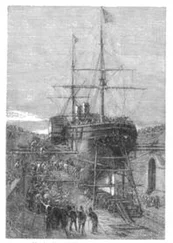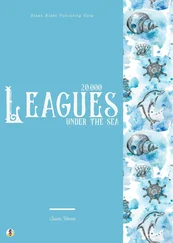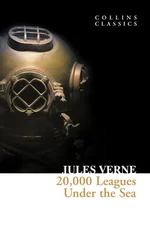Jules Verne - Twenty Thousand Leagues Under the Sea
Здесь есть возможность читать онлайн «Jules Verne - Twenty Thousand Leagues Under the Sea» — ознакомительный отрывок электронной книги совершенно бесплатно, а после прочтения отрывка купить полную версию. В некоторых случаях можно слушать аудио, скачать через торрент в формате fb2 и присутствует краткое содержание. Жанр: sf_writing, на английском языке. Описание произведения, (предисловие) а так же отзывы посетителей доступны на портале библиотеки ЛибКат.
- Название:Twenty Thousand Leagues Under the Sea
- Автор:
- Жанр:
- Год:неизвестен
- ISBN:нет данных
- Рейтинг книги:5 / 5. Голосов: 2
-
Избранное:Добавить в избранное
- Отзывы:
-
Ваша оценка:
- 100
- 1
- 2
- 3
- 4
- 5
Twenty Thousand Leagues Under the Sea: краткое содержание, описание и аннотация
Предлагаем к чтению аннотацию, описание, краткое содержание или предисловие (зависит от того, что написал сам автор книги «Twenty Thousand Leagues Under the Sea»). Если вы не нашли необходимую информацию о книге — напишите в комментариях, мы постараемся отыскать её.
Twenty Thousand Leagues Under the Sea — читать онлайн ознакомительный отрывок
Ниже представлен текст книги, разбитый по страницам. Система сохранения места последней прочитанной страницы, позволяет с удобством читать онлайн бесплатно книгу «Twenty Thousand Leagues Under the Sea», без необходимости каждый раз заново искать на чём Вы остановились. Поставьте закладку, и сможете в любой момент перейти на страницу, на которой закончили чтение.
Интервал:
Закладка:
But this last hypothesis, plausible as it was, could not stand against inquiries made in both worlds. That a private gentleman should have such a machine at his command was not likely. Where, when, and how was it built? And how could its construction have been kept secret? Certainly a government might possess such a destructive machine. And in these disastrous times, when the ingenuity of man has multiplied the power of weapons of war, it was possible that, without the knowledge of others, a state might try to work such a formidable engine. After the chassepots came the torpedoes, after the torpedoes the submarine rams, then-the reaction. At least, I hope so.
But the hypothesis of a war-machine fell before the declaration of governments. As public interest was in question, and transatlantic communications suffered, their veracity could not be doubted. But, how admit that the construction of this submarine boat had escaped the public eye? For a private gentleman to keep the secret under such circumstances would be very difficult, and for a state whose every act is persistently watched by powerful rivals, certainly impossible.
After inquiries made in England, France, Russia, Prussia, Spain, Italy, and America, even in Turkey, the hypothesis of a submarine monitor was definitely rejected.
Upon my arrival in New York several persons did me the honor of consulting me on the phenomenon in question. I had published in France a work in quarto, in two volumes, entitled "Mysteries of the Great Submarine Grounds." This book, highly approved of in the learned world, gained for me a special reputation in this rather obscure branch of Natural History. My advice was asked. As long as I could deny the reality of the fact, I confined myself to a decided negative. But soon finding myself driven into a corner, I was obliged to explain myself categorically. And even "the Honorable Pierre Aronnax, Professor in the Museum of Paris," was called upon by the New York Herald to express a definite opinion of some sort. I did something. I spoke for want of power to hold my tongue. I discussed the question in all its forms, politically and scientifically; and I give here an extract from a carefully studied article which I published in the number of the 30th of April. It ran as follows:
"After examining one by one the different hypotheses, rejecting all other suggestions, it becomes necessary to admit the existence of a marine animal of enormous power.
"The great depths of the ocean are entirely unknown to us. Soundings cannot reach them. What passes in those remote depths-what beings live, or can live, twelve or fifteen miles beneath the surface of the waters-what is the organization of these animals-we can scarcely conjecture. However, the solution of the problem submitted to me may modify the form of the dilemma. Either we do know all the varieties of beings which people our planet, or we do not. If we do not know them all, if Nature still has secrets in ichthyology for us, nothing is more conformable to reason than to admit the existence of fishes, or cetaceans of other kinds, or even of new species, of an organization formed to inhabit the strata inaccessible to soundings, and which an accident of some sort, either fantastical or capricious, has brought at long intervals to the upper level of the ocean.
"If, on the contrary, we do know all living kinds, we must necessarily seek for the animal in question among those marine beings already classed; and, in that case, I should be disposed to admit the existence of a gigantic narwhal.
"The common narwhal, or unicorn of the sea, often attains a length of sixty feet. Increase its size fivefold or tenfold, give it strength proportionate to its size, lengthen its destructive weapons, and you obtain the animal required. It will have the proportions determined by the officers of the Shannon, the instrument required by the perforation of the Scotia, and the power necessary to pierce the hull of the steamer.
"Indeed the narwhal is armed with a sort of ivory sword, a halberd, according to the expression of certain naturalists. The principal tusk has the hardness of steel. Some of these tusks have been found buried in the bodies of whales, which the unicorn always attacks with success. Others have been drawn out, not without trouble, from the bottoms of ships, which they had pierced through and through, as a gimlet pierces a barrel. The Museum of the Faculty of Medicine of Paris possesses one of these defensive weapons, two yards and a quarter in length, and fifteen inches in diameter at the base.
"Very well! Suppose this weapon to be six times stronger, and the animal ten times more powerful; launch it at the rate of twenty miles an hour, and you obtain a shock capable of producing the catastrophe required. Until further information, therefore, I shall maintain it to be a sea-unicorn of colossal dimensions, armed, not with a halberd, but with a real spur, as the armored frigates, or the "rams' of war, whose massiveness and motive power it would possess at the same time. Thus may this inexplicable phenomenon be explained, unless there be something over and above all that one has ever conjectured, seen, perceived, or experienced; which is just within the bounds of possibility."
These last words were cowardly on my part; but, up to a certain point, I wished to shelter my dignity as professor, and not give too much cause for laughter to the Americans, who laugh well when they do laugh. I reserved for myself a way of escape. In effect, however, I admitted the existence of the "monster." My article was warmly discussed, which procured it a high reputation. It rallied round it a certain number of partisans. The solution it proposed gave, at least, full liberty to the imagination. The human mind delights in grand conceptions of supernatural beings. And the sea is precisely their best vehicle, the only medium through which these giants (against which terrestrial animals, such as elephants or rhinoceroses, are as nothing) can be produced or developed.
The industrial and commercial papers treated the question chiefly from this point of view. The Shipping and Mercantile Gazette, the Lloyds' List, the Packet-Boat and the Maritime and Colonial Review, all papers devoted to insurance companies which threatened to raise their rates of premium, were unanimous on this point. Public opinion had been pronounced. The United States was the first in the field; and in New York they made preparations for an expedition destined to pursue this narwhal. A frigate of great speed, the Abraham Lincoln, was put in commission, as soon as possible. The arsenals were opened to Commander Farragut, who hastened the arming of his frigate; but, as it always happens, the moment it was decided to pursue the monster, the monster did not appear. For two months no one heard it spoken of. No ship met with it. It seemed as if this unicorn knew of the plots weaving around it. It had been so much talked of, even through the Atlantic cable, that jesters pretended that this slender fly had stopped a telegram on its passage, and was making the most of it.
So when the frigate had been armed for a long campaign, and provided with formidable fishing apparatus, no one could tell what course to pursue. Impatience grew apace, when, on the 2d of June, they learned that a steamer of the line of San Francisco, from California to Shanghai, had seen the animal three weeks before in the North Pacific Ocean. The excitement caused by this news was extreme. The ship was revictualed and well stocked with coal.
Three hours before the Abraham Lincoln left Brooklyn pier, I received a letter worded as follows:
To M. Aronnax, Professor in the Museum of Paris,
Fifth Avenue Hotel, New York.
Sir: If you will consent to join the Abraham Lincoln in this expedition, the government of the United States will with pleasure see France represented in the enterprise. Commander Farragut has a cabin at your disposal.
Читать дальшеИнтервал:
Закладка:
Похожие книги на «Twenty Thousand Leagues Under the Sea»
Представляем Вашему вниманию похожие книги на «Twenty Thousand Leagues Under the Sea» списком для выбора. Мы отобрали схожую по названию и смыслу литературу в надежде предоставить читателям больше вариантов отыскать новые, интересные, ещё непрочитанные произведения.
Обсуждение, отзывы о книге «Twenty Thousand Leagues Under the Sea» и просто собственные мнения читателей. Оставьте ваши комментарии, напишите, что Вы думаете о произведении, его смысле или главных героях. Укажите что конкретно понравилось, а что нет, и почему Вы так считаете.












